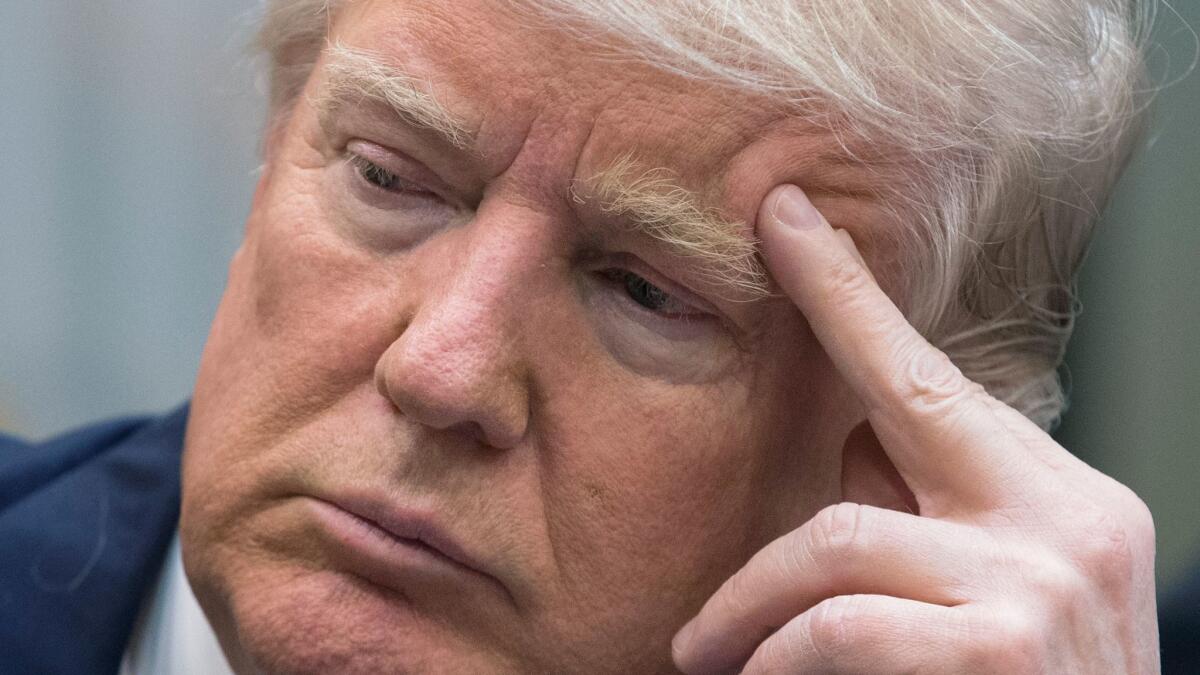Column: Faced with fear of a despotic government or apathy, I’ll take fear

- Share via
Dystopia is in the air these days. George Orwell’s “1984” is selling like hotcakes – if hotcakes still sold well in this low-carb world. Is the president to blame?
I think historians, no doubt working from their subterranean monasteries, bunkered from the radioactive wasteland above, will note that dystopianism, apocalypticism and other forms of existential paranoia actually predate the Trump presidency. It’s a fever that passes from one subset of the population to another and, occasionally, blows up into a full-scale pandemic. We all carry the infection in us, sometimes slow-simmering, sometimes in remission and sometimes in extremis.
Hollywood has been running through practice scenarios of doom nonstop from its founding.
Indeed, end-of-the-worldism is, and has long been, a lucrative market niche. To believe that, one need only catch a “food insurance” ad on TV.
Under President Obama, survivalists and other tribes of doomsday preppers were the stuff of late-night comedian mockery and day-time MSNBC journalistic japery. Now they look more like trendsetters.
Apathy is the grease that makes slippery slopes so treacherous.
Shortly before the Trump inauguration, the New Yorker profiled Silicon Valley moguls and other liberal 1-percenters stocking up on MREs and ammo. “I keep a helicopter gassed up all the time, and I have an underground bunker with an air-filtration system.” An investment banker told the New Yorker’s Peter Osnos. “A lot of my friends do the guns and the motorcycles and the gold coins. That’s not too rare anymore.”
Madonna has a new little film out in which she declares we live in a “new age of tyranny” where “all marginalized people are in danger” and “where being uniquely different might truly be considered a crime.”
So an insanely rich, decades-long global media icon is claiming the mantle of the marginalized and oppressed. Where does she find the courage to speak up?
While it’s always easy – and often fun – to point out the irrational paranoia in others, I generally like this tendency in American culture, so long as it’s kept reasonably in check. The founders were terrified of tyranny. The Federalist Papers name-checks one tyrannical cautionary tale after another, from the “tyranny of the Macedonian garrisons” to the “elective despotism” of the Venetian republic.
The framers’ genius lay in their observation that the greatest check on unbridled, or “concentrated,” power was the fear it aroused in competing factions.
In other words, fear gets a bad rap. President Franklin D. Roosevelt gets too much praise for his claim that the only thing Americans had to fear was “fear itself.” Fear imparts vital information. I fear snakes and sharks and the possibility of falling out of an airplane. These are all healthy fears. Fear is dangerous – and not always even then – when it serves as a substitute for thinking. (I still swim in the ocean and travel on airplanes.) But fear can be very useful when it informs our thinking, when it focuses the mind on potential dangers ahead.
Apathy is the practical opposite of fear. Given that tyranny, going by the historical and evolutionary record, is the natural state of humankind, the greatest bulwark against it is a highly cultivated, deeply informed, but nonetheless instinctive fear. Edmund Burke never actually uttered the most famous quote attributed to him – “The only thing necessary for the triumph of evil is for good men to do nothing” – though that is certainly a useful summation of his views. And it’s certainly true.
Apathy is the grease that makes slippery slopes so treacherous.
One of the things that make our politics so ugly isn’t fear, but a lack of sympathetic imagination for the fear of others. Under Obama (and FDR and others), many conservatives articulated thoughtful, informed and rational fears about where his policies might take the country. Other, often louder conservatives offered barbaric yawps based on some of the same fears. The standard liberal response was undifferentiated scorn and mockery. Today (as under presidents Bush and Reagan and others), the tables have turned, and the roles have been reversed.
It’s far better to cultivate mutual understanding of each other’s fears than try to smooth away the fear of tyranny with the grease of apathy.
Follow the Opinion section on Twitter @latimesopinion or Facebook
MORE FROM OPINION
The joke is on voters who trusted Trump’s healthcare promises
More to Read
A cure for the common opinion
Get thought-provoking perspectives with our weekly newsletter.
You may occasionally receive promotional content from the Los Angeles Times.










